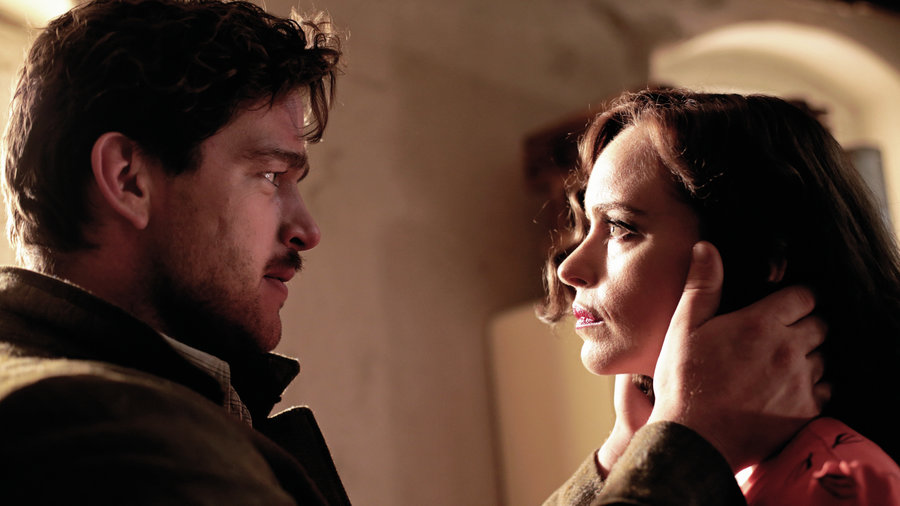When the film becomes a two-fer between Hoss and Zehrfeld, who’ve repeatedly worked together under Petzold, it turns into an homage to Vertigo with the added weight of historical atrocity. Johnny is trying to recreate a wife he’s sure is gone, while Nelly is trying to turn herself back into who she used to be. To her surprise, the only thing that Nelly can recreate is her handwriting. To Johnny, Nelly calls herself Esther, and Esther has none of the bearing that Johnny says his wife used to have. She doesn’t walk the same way, among many other differences that Esther cannot get right. Johnny is most concerned with her big glamorous reentry to Berlin, decked out in Parisian fashion and make-up as she miraculously steps off a train and back into his and their old friend’s lives. Even in her depraved and damaged state, Nelly as Esther can only voice her displeasure at such a proposition. Who would return from the camps like that? Who would care about designer shoes after being forced to live in squalor and deprivation?
Melancholy radiates out of every scene in Phoenix, befitting post-war Germany. The city is as ruined as Nelly is, a shade of its former self with dim possibilities of soon returning to what used to be normal. Nelly’s nighttime explorations show a population warped by what they’ve gone through, with casual, unchallenged cruelty within the Phoenix club and without it. The possibility of fleeing to unstable Israel, with an antithetical color palette to this gray waste, seems like the easiest choice in the world, but where all see devastation, Nelly sees possibility, in spite of everything. If these bricks can be cleared, if new structures can be erected, if things can return to some semblance of normal, then maybe she can rebuild her life, too. The people of Berlin certainly seem to think so. Johnny himself is stout, well-fed compared to Nelly’s skeletal frame. The Phoenix club is neatly situated next to rubble, proceeding as if everything was fine. By the time, Nelly and Johnny’s bourgeois friends are introduced, the viewer is repulsed by their desire to return to leisure. The film plays out as Nelly questions the value of going back to her pre-war life, something Lene has repeatedly judged as futile but these friends have managed to do so, for good or ill. Phoenix wonders if rebuilding is a kind of capitulation, an absurd impulse to pretend the past never happened. That’s a difficult proposition when the past is tattooed on a person’s arm.
As Nelly, Hoss is giving one of the best performances of the decade, full stop. In scenes where she grapples with the obscenity of Johnny’s plan for her grand reentrance, her entire body is dedicated to the role. The battle between her revulsion at the idea and her desire to be back with Johnny plays out visibly, with tremors and contortions and thwarted tears being stuffed back into herself while she keeps up an increasingly uncomfortable fiction. The way Hoss catches herself in referring to Nelly’s clothes as her own is blinding while also being almost imperceptible. Zehrfeld isn’t her equal, because who could be, but he plays Johnny as more than a callous oaf. He’s as resigned to his new life as she’s perversely hopeful, and Petzold gives him a few moments where he remembers life with Nelly and perks up, demonstrating some of the charm that would have drawn her to him in the first place. They share a jaw-dropping final scene that is masterful in its simplicity and its cumulative power, marking it as one of the best endings of recent cinema to go with Hoss’ towering performance.
Phoenix is only the second Petzold film I’ve seen after Barbara, and it inspires a closer look at his and Hoss’ earlier collaborations. They are bringing out the absolute best in each other here, and whether that magic was always present or needed time to perfect itself is a question worth answering. Hardly just about the Holocaust itself, Phoenix resonates for any kind of deep loss. Is the person from before gone forever, reshaped by experience into something new and different? Is trying to recapture that person just an act of imagination? Did the murderers of the Third Reich succeed in spite of the many who survived the camps, erasing the person who was even though they walked out of the gates themselves? Trauma lives on in survivors, no matter how much those adjacent to it would prefer to think otherwise. The phoenix doesn’t burst from the ashes, but crawls out slowly. A

 RSS Feed
RSS Feed